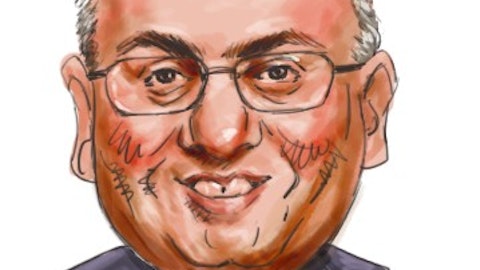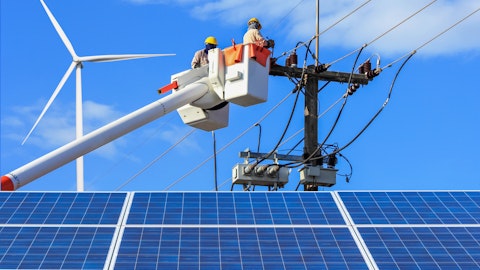Gale Klappa: Yes, exactly. There’s no reopener related to the equity layer or the ROE. This is simply related to capital investments in projects already approved. So, I hope that answers that question. And then, in terms of just the general backdrop, I think one of the things that I believe Julien you actually did an interview with the Chairperson of the Wisconsin Commission, I would just encourage everyone to listen and read through some of the additional comments that she has made related to her view of the future of regulation in Wisconsin, wanting very much to be credit supportive as the decision was of our Wisconsin utilities and wanting to maintain the reputation of the Wisconsin Commission is very professional and certainly carrying out day-to-day the concept of gradualism.
So, I hope that’s helpful. And then secondly, on Riverside, we have already provided on time, all of the additional modeling data that the commission asked for in terms of modeling the impact of us exercising the Riverside option and to level set everyone. Riverside is a natural gas combined cycle plant at Alliant built. During the construction process, we agreed with Alliant that we would have two options each for 100 megawatts per option to essentially acquire at book value, those megawatts over a certain period of time. So, this particular question that you have relates to the first option. And again, the modeling data that the commission asked for is in their hands right now. And we expect sometime in the next 45, certainly no more than 60 days for the commission to take up the matter.
So, I hope that responds and I hope we didn’t miss anything.
Julien Dumoulin-Smith: A lot there. Just lastly, super quick. On Oak Creek, just the current unrecovered balance of scrubber and plant, just as far as getting recovery there and any obstacles in that end? That was the last one.
Gale Klappa: Okay. Great. Thank you for reminding us. The current book balance for the older Oak Creek units — remember, there are four older Oak Creek units. They’re labeled Oak Creek 5, 6, 7 and 8. Those units went into service, I mean, literally, I think the oldest one was 1959 and the others are 1960s vintage units. So, the base plant itself, there’s almost no book value left. The major part of the book value is in the emission controls, the modern emission controls that we build and put on those units at least a decade ago now. And that is roughly about $400 million. But I would remind everyone that that’s not a subject for the limited reopener in Wisconsin in 2024, because the retirement dates have been pushed out a bit, given the tight capacity market. Scott, anything you’d like to add?
Scott Lauber: And remember, when we look at those retirements. We also — when they do retire, when all 4 of them retire, that’s like $30 million to $35 million of reduced O&M expense along with less fuel cost. So, we’ll be looking at them. I think our current date is May of €˜24. So potentially, we’ll be analyzing it, but we’ve got to look at our capacity situation. But right now, that is the plan. So, maybe part of the limited reopener. When you look at the whole picture, it reduces O&M costs, it reduces fuel cost. And remember, we’re replacing a lot of this capacity, some of it’s with renewables and get that production tax credits there in the front end. It’s going to be very good for customers.
Gale Klappa: Yes. Scott’s right. There’s some immediate significant savings. And you think about $30 million to $35 million of O&M savings from the closure of the plant. And on top of that, you get fuel cost savings.
Operator: We’ll take the next question from Jeremy Tonet with JPMorgan.
Jeremy Tonet: I just wanted to pick up a little bit on the prior conversation there with regards to Wisconsin Commission. And are you hearing anything from the Governor or stakeholders about who the next commissioner might be if the Governor has any particular policy goals for the commission that could potentially be expressed in this next nominee?
Gale Klappa: No. In terms of any particular change of policy goals, no. The conversations we’re hearing related to the concept of what the appropriate next appointee will be, really, in my opinion and from everything we’ve heard, revolve around the major concerns that the Governor has had since he took office, which is reliability, affordability and the continued transition away from fossil fuels, but in a pace and in a manner that preserves reliability. So, nothing different in terms of our belief in the Governor’s policy objectives. And the other thing that I would say is I would be shocked if the vetting process was not already underway. We would expect some type of an appointment announcement, if you will, I would guess, in the next 60 days.
The other point, I think, that’s important to remember is all the governors appointees have to be confirmed by the state Senate. And the Senate is heavily Republican. And I think all of that leads to the type of an appointment that’s really close to the center line in terms of philosophy and in terms of approach of continuing the same type of approach the commission has been noted for over the course of many decades. I hope that helps, Jeremy.
Jeremy Tonet: Yes. No, that’s helpful there. I didn’t mean — I don’t think I said different. I was just more thinking just type of policy as far as — we were under the impression that maybe some labor-oriented policy might be in focus here. So, I didn’t know if that was something that had come across our radar, but we can move along here.
Gale Klappa: Well, Jeremy, actually, to your point, we do know, and we’ve had conversations with the Governor’s office. As more and more renewable projects are under development, under construction inside the state of Wisconsin, we do know the Governor’s office is very interested and making sure as many of those jobs as possible are Wisconsin jobs. So, what you’re saying would not be a particular surprise. I think that’s been part of the Governor’s agenda from the very beginning.
Jeremy Tonet: Right. Right. Great. Thank you for that. And then kind of moving along and recognizing it’s earlier in the PGS rate case process, but have you received any stakeholder feedback here, particularly in how the QIP rider impacts this? And any sense from the legislature on an extension?
Gale Klappa: Well, as you probably recall, our filing position, if you will, and we announced when we filed the case on January 6th, that it would not be our intention to try to extend the QIP rider through legislation. It’s pretty clear from conversations with a number of the policymakers, including the Governor’s office in Illinois, that the preference is to return to traditional rate making procedures for all the capital investments that PGL and North Shore are making, but in particular, the capital investments that had been part of the, what we call, the QIP rider program. So, when you think about it and actually — we’ve really talked about this a lot internally. First of all, important to point out that the Illinois regulatory process in these rate reviews utilizes a forward-looking test period.
So, even with going to a traditional ratemaking process, you’re in a forward-looking test period. So, that should help in terms of eliminating regulatory lag. Number one. Number two, actually going through a rate review with all of the testimony and all of the different stakeholders being able to voice their opinions, actually, I think it’s going to be a positive thing because there’s been noise about the method of recovery of the investment as opposed to the need for the investment. What this will allow us to do — this process over the course of 2023, this will allow us to again make the case for why the upgrade of aging, deteriorating piping systems underneath Chicago is so, so necessary for the safety and efficiency and stability of gas distribution in Chicago.
So actually, we kind of look forward to the debate. And we look forward to the whole process, which Scott will take probably through close to December.
Scott Lauber: It would take most of the year. And they’re just — currently, we’ll — we haven’t even seen a final schedule yet. So, that will be coming out.
Jeremy Tonet: Got it. That’s very helpful.





